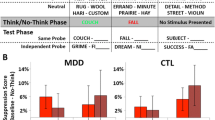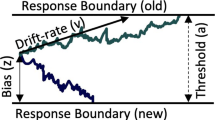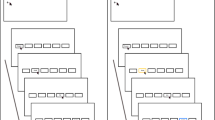Abstract
Studies of selective memory in depression have been guided by the hypothesis that depressed individuals excel in remembering negative information about themselves. The present paper argues that response bias must be considered as an alternative explanation of selective memory effects; specifically, it is proposed that in some situations depressives may be more willing, but not more able, to report remembering negative self-relevant information. Depressed, formerly depressed, and nondepressed female college students were given recall and recognition tests for positive and negative adjectives which they had previously selected as being self-descriptive. Depressed subjects were found to recall correctly more negative adjectives, produce more negative intrusions in recall, and produce more negative false alarms in recognition. However, a signal detection analysis revealed that depressives' memories, as indexed by d', were not superior to the other groups'; rather, they employed a more liberal criterion in making recognition judgments (beta). The hypothesis that depressives show a response bias favoring the report of negative self-relevant information was therefore confirmed and can account for both the recall and recognition results.
Similar content being viewed by others
Reference Notes
Javna, C. D.Depressed and nondepressed college students' interpretations of and memory for feedback about self and others. Paper presented at the meeting of the Association for the Advancement of Behavior Therapy, Toronto, 1981.
Post, R. D., Lobitz, W. C., & Gasparikova-Krasnec, M.The utilization of positive and negative feedback in the self-evaluation responses of depressed and nondepressed psychiatric patients. Unpublished manuscript, University of Colorado School of Medicine, 1979.
References
Ahroon, W. A., Jr., & Pastore, R. E. Procedures for computing d' andβ.Behavior Research Methods and Instrumentation 1977,9 533–537.
Anderson, J. R., & Bower, G. H. Recognition and retrieval processes in free recall.Psychological Review 1972,79 97–123.
Anderson, N. Likeableness ratings of 555 personality-trait adjectives.Journal of Personality and Social Psychology 1968,9 272–279.
Beck, A. T.Depression: Clinical, experimental, and theoretical aspects. New York: Hoeber, 1967.
Beck, A., Rial, W., & Rickels, K. Short form of depression inventory: Cross-validation.Psychological Reports 1974,34 1184–1186.
Buchwald, A. M. Depressive mood and estimates of reinforcement frequency.Journal of Abnormal Psychology 1977,86 443–446.
DeMonbreun, B. G., & Craighead, W. E. Distortions of perception and recall of positive and neutral feedback in depression.Cognitive Therapy and Research 1977,1 311–329.
Depue, R. A., & Monroe, S. M. Learned helplessness in the perspective of the depressive disorders: Conceptual and definitional issues.Journal of Abnormal Psychology 1978,87 3–20.
Dixon, W. J., & Brown, M. B.BMDP-77. Berkeley: University of California Press, 1977.
Kovacs, M., & Beck, A. T. Maladaptive cognitive structures in depression.American Journal of Psychiatry 1978,135 525–533.
Kuiper, N. A., Derry, P. A., & MacDonald, M. R. Self-reference and person perception in depression: A social cognition approach. In G. Weary & H. Mirels (Eds.),Integrations of clinical and social psychology. New York: Oxford University Press, 1981.
Lloyd, G. G., & Lishman, W. A. Effect of depression on the speed of recall of pleasant and unpleasant experiences.Psychological Medicine 1975,5 173–180.
Nelson, R. E., & Craighead, W. E. Perception of reinforcement, self-reinforcement and depression.Journal of Abnormal Psychology 1977,86 379–388.
Roth, D., & Rehm, L. P. Relationships among self-monitoring processes, memory, and depression.Cognitive Therapy and Research 1980,4 149–157.
Schwarz, J. C., & Zuroff, D. C. Family structure and depression in female college students: Effects of parental conflict, decision-making power, and inconsistency of love.Journal of Abnormal Psychology 1979,88 398–406.
Teasdale, J. D., & Fogarty, S. J. Differential effects of induced mood on retrieval of pleasant and unpleasant events from episodic memory.Journal of Abnormal Psychology 1979,88 248–257.
Wener, A. E., & Rehm, L. P. Depressive affect: A test of behavioral hypotheses.Journal of Abnormal Psychology 1975,84 221–227.
Zuroff, D. C. Distortions of memory in depressed, formerly depressed, and never depressed college students.Psychological Reports 1980,46 415–425.
Author information
Authors and Affiliations
Additional information
We thank Bob Malmi and Christian Mueller for their critical readings of this manuscript and for many hours of discussion of cognitive psychology.
Rights and permissions
About this article
Cite this article
Zuroff, D.C., Colussy, S.A. & Wielgus, M.S. Selective memory and depression: A cautionary note concerning response bias. Cogn Ther Res 7, 223–231 (1983). https://doi.org/10.1007/BF01205136
Issue Date:
DOI: https://doi.org/10.1007/BF01205136




